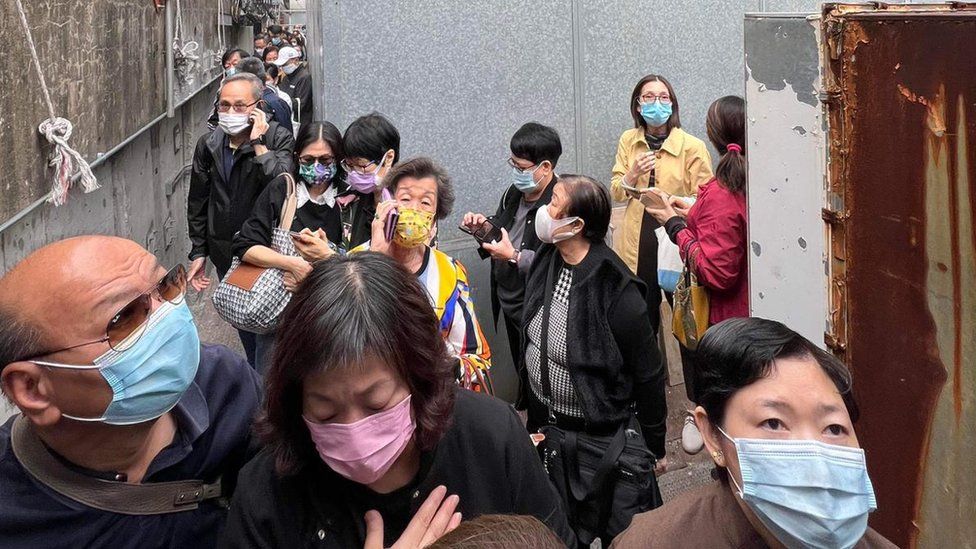Omicron: Mutations prompt new coronavirus variant concern from WHO

The variant, given the name Omicron, was first reported to the WHO from South Africa on 24 November.
Previously known as B.1.1.529, it has also been identified in Botswana, Belgium, Hong Kong and Israel.
The WHO said on Friday that early evidence suggested an increased risk of reinfection with this variant.
In a statement on Friday the organisation said the number of cases of this variant appeared to be increasing in almost all South African provinces.
"This variant has a large number of mutations, some of which are concerning," it said.
It is not uncommon for a virus to change, or mutate, over time. A variant becomes a variant of concern when that mutation might affect things like transmissibility, virulence or the effectiveness of vaccines.
The WHO has said it will take a few weeks to understand the impact of the new variant, as scientists work to determine how transmissible it is.
It has warned against countries hastily imposing travel restrictions, saying they should look to a "risk-based and scientific approach".
However, the UK, EU countries and Switzerland have temporarily halted flights from some southern African countries.
"It is now important that all of us in Europe act very swiftly, decisively and united," European Commission chief Ursula von der Leyen said.
South Africa's Health Minister Joe Phaahla told reporters that the flight bans were "unjustified".
"The reaction of some of the countries, in terms of imposing travel bans, and such measures, are completely against the norms and standards as guided by the World Health Organization," he said.
Stock markets across the world also fell sharply on Friday, reflecting the fears of investors over the potential economic impact.
The variant, given the name Omicron, was first reported to the WHO from South Africa on 24 November.
Previously known as B.1.1.529, it has also been identified in Botswana, Belgium, Hong Kong and Israel.
The WHO said on Friday that early evidence suggested an increased risk of reinfection with this variant.
In a statement on Friday the organisation said the number of cases of this variant appeared to be increasing in almost all South African provinces.
"This variant has a large number of mutations, some of which are concerning," it said.
It is not uncommon for a virus to change, or mutate, over time. A variant becomes a variant of concern when that mutation might affect things like transmissibility, virulence or the effectiveness of vaccines.
The WHO has said it will take a few weeks to understand the impact of the new variant, as scientists work to determine how transmissible it is.
It has warned against countries hastily imposing travel restrictions, saying they should look to a "risk-based and scientific approach".
However, the UK, EU countries and Switzerland have temporarily halted flights from some southern African countries.
"It is now important that all of us in Europe act very swiftly, decisively and united," European Commission chief Ursula von der Leyen said.
South Africa's Health Minister Joe Phaahla told reporters that the flight bans were "unjustified".
"The reaction of some of the countries, in terms of imposing travel bans, and such measures, are completely against the norms and standards as guided by the World Health Organization," he said.
Stock markets across the world also fell sharply on Friday, reflecting the fears of investors over the potential economic impact.
The variant, given the name Omicron, was first reported to the WHO from South Africa on 24 November.
Previously known as B.1.1.529, it has also been identified in Botswana, Belgium, Hong Kong and Israel.
The WHO said on Friday that early evidence suggested an increased risk of reinfection with this variant.
In a statement on Friday the organisation said the number of cases of this variant appeared to be increasing in almost all South African provinces.
"This variant has a large number of mutations, some of which are concerning," it said.
It is not uncommon for a virus to change, or mutate, over time. A variant becomes a variant of concern when that mutation might affect things like transmissibility, virulence or the effectiveness of vaccines.
The WHO has said it will take a few weeks to understand the impact of the new variant, as scientists work to determine how transmissible it is.
It has warned against countries hastily imposing travel restrictions, saying they should look to a "risk-based and scientific approach".
However, the UK, EU countries and Switzerland have temporarily halted flights from some southern African countries.
"It is now important that all of us in Europe act very swiftly, decisively and united," European Commission chief Ursula von der Leyen said.
South Africa's Health Minister Joe Phaahla told reporters that the flight bans were "unjustified".
"The reaction of some of the countries, in terms of imposing travel bans, and such measures, are completely against the norms and standards as guided by the World Health Organization," he said.
Stock markets across the world also fell sharply on Friday, reflecting the fears of investors over the potential economic impact.
The variant, given the name Omicron, was first reported to the WHO from South Africa on 24 November.
Previously known as B.1.1.529, it has also been identified in Botswana, Belgium, Hong Kong and Israel.
The WHO said on Friday that early evidence suggested an increased risk of reinfection with this variant.
In a statement on Friday the organisation said the number of cases of this variant appeared to be increasing in almost all South African provinces.
"This variant has a large number of mutations, some of which are concerning," it said.
It is not uncommon for a virus to change, or mutate, over time. A variant becomes a variant of concern when that mutation might affect things like transmissibility, virulence or the effectiveness of vaccines.
The WHO has said it will take a few weeks to understand the impact of the new variant, as scientists work to determine how transmissible it is.
It has warned against countries hastily imposing travel restrictions, saying they should look to a "risk-based and scientific approach".
However, the UK, EU countries and Switzerland have temporarily halted flights from some southern African countries.
"It is now important that all of us in Europe act very swiftly, decisively and united," European Commission chief Ursula von der Leyen said.
South Africa's Health Minister Joe Phaahla told reporters that the flight bans were "unjustified".
"The reaction of some of the countries, in terms of imposing travel bans, and such measures, are completely against the norms and standards as guided by the World Health Organization," he said.
Stock markets across the world also fell sharply on Friday, reflecting the fears of investors over the potential economic impact.

WHO chief worried about ‘tsunami’ of omicron, delta cases
- The head of the World Health Organization said Wednesday that he’s worried about the omicron and delta variants of COVID-19 producing a “tsunami”

Hong Kong: Fire at World Trade Centre leaves hundreds trapped on roof
- Around 300 people were trapped on the roof of Hong Kongs World Trade Centre on Wednesday after a fire broke out.

Classical And Modified Driving Services in Whole Arab Countries
- Young women shouldnt use any shallow thing while at the same time driving, there is no inspiration

Pakistans Defensive Response in Iran Immediate Actions Following Warning of Potential Consequence
- Explore Pakistans swift defensive response in Iran a day after issuing a stern warning about potential consequences Stay informed on regional developments